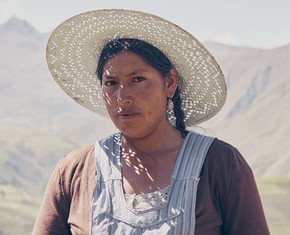The views expressed in our content reflect individual perspectives and do not represent the authoritative views of the Baha'i Faith.
In 1972, my wife Nancy and I became a married couple. Our many years together have taught us a few things about achieving marital and spiritual bliss, and I’d like to share them here.
Having obtained the consent of our four living parents – a great law laid down by Baha’u’llah to promote family unity and strengthen the social fabric of society – our wedding in Arlington, Texas, hosted a mix of races and persuasions. As we stood together before that small audience of friends and family, readings from sacred scriptures on the sanctity of marriage were read. At the end, we each uttered the simple, powerful Baha’i marriage vow: “We will all, verily, abide by the Will of God.”
RELATED: How Do You Know When You Find Your ‘Soulmate’?
Unfamiliar with the clergy-free Baha’i ceremony, and anxious that we were not actually married, Nancy’s devout Christian aunt rushed forward at that moment and exclaimed: “By the power vested in me by the state of Texas, I now pronounce you man and wife.” Nonplussed, Nancy replied that, “Well, we must really be married now.”
Awed by the sanctity of the occasion, we romanticized whether God had destined us for each other. Baha’u’llah appears to bless all such unions with this prayer:
With the hands of loving-kindness I have planted in the holy garden of paradise the young tree of your love and friendship, and have watered it with the goodly showers of My tender grace; now that the hour of its fruiting is come, strive that it may be protected …
Our union thus blessed, faithfulness to our Creator meant protecting the young tree of our marriage. As admonished by Abdu’l-Baha, couples should “… irrigate continually the tree of your union with the water of love and affection, so that it may remain green and verdant throughout all seasons,” lest “this foundation of love be shaken in the least.”
For us, to “irrigate continually” with “the water of love” meant that we should:
- share noble aspirations,
- show concern for each other,
- exhibit mutual respect,
- convey sexual sensitivities,
- harbor no grievances or secrets,
- practice patience and forbearance,
- be trustworthy and faithful, and
- demonstrate kindness and hospitality.
As two pillars supporting an institution considered divine by Baha’u’llah, we would strive to overlook our shortcomings, affirm praiseworthy qualities, and avoid harsh criticism.
Early on we realized that protecting our union meant sharing a common purpose – serving our Faith. Fundamentally Baha’i service means striving to better the human condition through one’s profession, social action, community building, and the education of children, amongst others. It also means offering Baha’i principles as solutions to the perplexing problems affecting humanity.
Together we served on Baha’i local, regional, and national councils, hosted study classes, visited isolated friends, and attended conferences. In 1975, we resettled in Argentina for two years to share Baha’u’llah’s message of unity in that culture.
Within six years, we were blessed with three healthy children. Enjoined by Baha’u’llah to “Marry, O people, that from you may appear he who will remember Me amongst My servants,” the blessing of having children found us consecrating ourselves to their training so that they might develop moral integrity and benefit the world of humanity.
RELATED: 3 Spiritual Steps to Building – and Keeping – Family Unity
In his writings, Baha’u’llah describes marriage as a “fortress for well-being and salvation.” The purpose of marriage, then, involves improving the spiritual life of our partner. We found that the grinding of our distinct personalities and the complexities of life tested – and yet ultimately strengthened – the pillars of our union. The love we shared for each other found us striving to protect our relationship through better communication and Baha’i consultation.
According to the Baha’i principles of consultation, couples should consult on all matters affecting their relationship. There will be times when the husband or wife should defer to the other, but neither should attempt to dominate or control the other. In cases of unresolved disagreement, the couple should together seek the counsel of trustworthy persons in whose sound judgment they can confide. Baha’u’llah wrote: “Consultation bestoweth greater awareness and transmiteth conjecture into certitude.”
Every marriage encounters tests and troubles, but Baha’u’llah strongly condemned divorce, which means that every effort must be made to salvage a troubled marriage for the sake of God, and especially for sake of any children. For Baha’is, divorce is only permitted, the Baha’i teachings say, “when an irreconcilable antipathy exists between the two parties to the marriage.”
While the Baha’i teachings remind us that the purpose of tests and difficulties is for our own perfecting, marriage, being the closest of human relationships, does not have to be undermined by offending issues. Abdu’l-Baha counseled Baha’is not to allow an offense to linger in the heart. Rather, he said, “they must … explain its nature to each other and try to remove it as soon as possible.” Nor should the couple separately share marital grievances with sympathetic friends or family, lest an offense be magnified, or unresolved issues undermine affection and lead to estrangement.
Since Baha’u’llah came to establish unity in the world, divorce, like ripples in a pond, radiates outward affecting family, friends, children, and community. The Universal House of Justice, the democratically-elected global Baha’i administrative body, points out that:
The effort required to preserve and strengthen a Baha’i marriage is prolonged and inescapable. It requires prayer, perseverance, self-sacrifice, mutual respect, a willingness to cooperate and to forgive, and frank and loving consultation. It can, at times be very painful. However … even in seemingly impossible cases, is frequently blessed with a positive outcome. …
Marriage can be a source of well-being, conveying a sense of security and spiritual happiness. However, it is not something that just happens. To become a haven of contentment requires the cooperation of the marriage partners and assistance of their families.
In his writings, Abdu’l-Baha made married couples a joyful promise:
… woman and man … (should) abide with each other in the closest companionship, and to be even as a single soul. They are two helpmates, two intimate friends, who should be concerned about the welfare of each other. … If they live thus, they will pass through this world with perfect contentment, bliss, and peace of heart, and become the object of divine grace and favor in the Kingdom of heaven. … Strive, then, to abide, heart and soul, with each other as two doves in the nest, for this is to be blessed in both worlds.
RELATED: The Bittersweet Love Story of The Bab and His Beloved Wife
Recently Nancy and I commemorated 51 years of marriage. The long odyssey of our lives has taken us to Argentina, five U.S. states, Portugal, and now Canada. We have become, as the Baha’i writings encourage, citizens of the world. Now in our 70s, we continue to explore the world and its peoples through Zoom meetings, international courses, and writing projects. We still travel, as well, feeling certain that longevity rests on being actively interested in living and adventuring.
Over these long and wonderful years together, we have become the best of companions. We cherish the hope that our marriage will be blessed in the next life as a divine favor for our love, perseverance, and union. In the words of Abdu’l-Baha, “No mortal can conceive the union and harmony which God has designed for man and wife … throughout all the worlds of God.”
















Comments
Sign in or create an account
Continue with Googleor